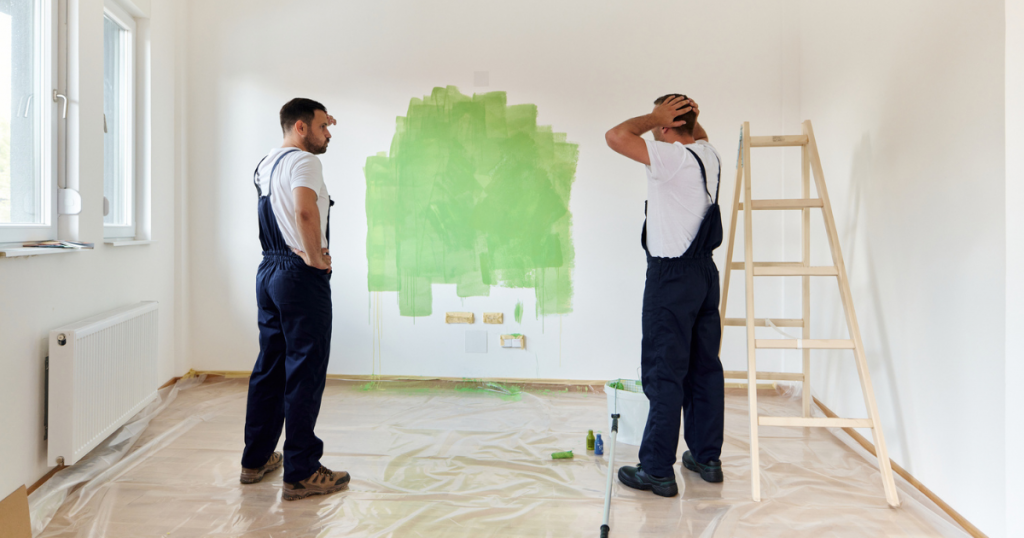
What Should You Look for in a Commercial Painter?
When it comes to painting, whether it’s the exterior of a commercial building or the interior of a house, a good paint job can make all the difference. But what should you look for in a commercial painter to ensure the job is done right? In this blog, we’ll explore the signs of a bad paint job, the qualities of a good painter, and how to find the right professional for your project.
Signs of a Bad Paint Job
A bad paint job can be a costly and frustrating experience. Whether it’s an interior or exterior project, the signs of a poor paint job are similar. Here are some red flags to watch out for:
Signs of a Bad Exterior Paint Job
- Peeling Paint: If the paint is already peeling shortly after the job is done, it’s a clear sign of a bad paint job. This may be due to improper surface preparation or the use of low-quality paint.
- Cracking or Bubbling: Cracks or bubbles in the paint can indicate that the surface wasn’t properly cleaned or primed before painting.
- Inconsistent Color: If the color isn’t uniform, it shows a lack of attention to detail during the painting process.
- Uneven Coverage: Some areas may have thick paint while others have thin spots. This suggests poor workmanship.
- Paint Drips or Splatters: Careless application can result in unsightly drips or splatters.
Signs of a Bad Interior Paint Job
- Streaks and Lines: Uneven brush or roller strokes can leave streaks and lines on the walls.
- Visible Patching: If the painter didn’t properly patch holes or imperfections in the wall, you’ll see them through the paint.
- Paint on Fixtures and Trim: A bad painter may not take the time to tape off or properly protect fixtures, resulting in paint on areas it shouldn’t be.
- Uneven Edges: The edges where different colors or sections meet should be crisp and straight. Poorly executed edges can ruin the entire look.
- Paint Bleed: When different colors or types of paint bleed into each other, it indicates a lack of precision.
What Makes a Good Exterior Paint Job?
On the flip side, a good exterior paint job can enhance the curb appeal and protect the building from the elements. Here’s what you should expect from a quality exterior paint job:
- Proper Preparation: A good painter will thoroughly clean and prepare the surface before painting. This includes scraping, sanding, and priming as necessary.
- High-Quality Paint: Top-notch paint is essential for a long-lasting finish. A professional painter will use premium paint that withstands weather and UV rays.
- Attention to Detail: Crisp, clean lines, and consistent color are hallmarks of a good paint job. There should be no drips, splatters, or missed spots.
- Thorough Inspection: After the job is complete, a good painter will inspect the work and make any necessary touch-ups.
- Clear Communication: A professional painter will communicate clearly about the project timeline, cost, and any potential issues that may arise.
What to Look for in a Commercial Painter
Now that you know the signs of a bad paint job and what makes a good one, let’s discuss how to find the right commercial painter for your project. Consider the following questions and factors:
- Experience and References: Look for a painter with a proven track record. Ask for references and check online reviews to gauge their past performance.
- Licensing and Insurance: Ensure the painter is licensed and carries adequate insurance. This protects both you and the painter in case of accidents or damage.
- Portfolio: Review their portfolio to see examples of their previous work. This can help you assess their style and quality.
- Written Estimate: Get a detailed, written estimate that outlines the scope of work, materials, and costs. This will help you avoid any surprises.
- Warranty: Inquire about their warranty or guarantee for the work. A reputable painter should stand by their craftsmanship.
- Communication: A good painter should be easy to reach and responsive to your questions and concerns.
- Safety Practices: Make sure the painter follows safety protocols to protect both the workers and your property.
- Price: While price is a consideration, it should not be the sole determining factor. Quality should take precedence over the lowest bid.
By asking the right questions and considering these factors, you can find a commercial painter who will deliver a high-quality paint job that enhances the appearance and value of your property.
In conclusion, a bad paint job can be a costly and frustrating experience, but knowing the signs of poor workmanship and what makes a good paint job can help you make an informed choice when hiring a commercial painter. Take the time to do your research, ask the right questions, and choose a painter with the skills and experience to ensure a successful project.
